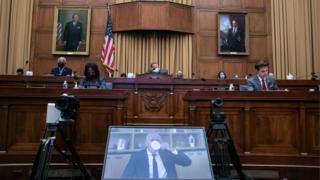Big Tech: What comes next for the US giants?

Image copyright
EPA
The hearing marked the first time Jeff Bezos has given testimony to Congress
“If Congress doesn’t bring fairness to Big Tech, which they should have done years ago, I will do it myself with executive orders.”
Those were US President Donald Trump’s words on Wednesday shortly before the leaders of Apple, Amazon, Alphabet and Facebook were quizzed by Congress.
That word “fairness” is crucial when it comes to the future regulation of these tech titans. That’s because, in the mouths of different lawmakers, fairness means very different things.
“These companies, as they exist today, have monopoly power… some need to be broken up, all need to be properly regulated.”
Those were the closing remarks of David Cicilline, chairman of the House judiciary committee’s anti-trust sub-committee.
For him, fairness means not just clipping the wings of Big Tech, but fundamentally restructuring their relationship with Americans.
Cicilline was one of many lawmakers who came out swinging. At one point he asked Amazon’s Jeff Bezos why the company had been compared to a drug dealer.
Image copyright
Reuters
Apple, Alphabet, Amazon and Facebook’s chiefs all gave testimony via video link because of the coronavirus pandemic
This being American politics, there was also – of course – a partisan split.
Republicans like Jim Jordan and Matt Gaetz had a different interpretation of fairness – and it had nothing to do with anti-trust.
“I’ll just cut straight to the chase. Big Tech’s out to get conservatives,” said Jordan.
Much of their ire centred around claims of censorship, specifically that Facebook and Google unfairly discriminate against conservatives.
President Trump has suggested likewise. He’s already criticised Twitter and Facebook for removing conservative content and even flagging his own posts and tweets.
US elections
This split makes predicting how the US might try to lasso these tech giants difficult.
Republicans are generally against market regulation, against increasing red tape.
Many Democrats however believe that these companies are acting like cartels – that they’re hurting “mom and pop” businesses. That tougher legislation will protect consumers.
The sub-committee will publish its recommendations – and then it’s down to lawmakers on Capitol Hill.
It’s highly unlikely though that anything much will happen before the US elections in November.
As well as the presidential vote, all the seats in the House of Representatives are up for grabs, as well as about a third of the Senate.
And so we reach a fork in the road for Big Tech in America.
A Republican win would probably see the tech giants scrutinised further over how they police free speech. Section 230 – which gives social media companies immunity from prosecution for what is published on their platforms – would probably be looked at.
If the Democrats win, expect more regulation in an attempt to inject more competition into the tech industry.
Image copyright
Getty Images
Sundar Pichai faced questions about bias and the extent Google makes use of user data to generate profits
In reality though, it’s unlikely to be that black and white.
There are Republicans that have sympathies for some of the anti-competition arguments, for example.
The accusations around Amazon hurting tens of thousands of small American businesses is a Republican concern as much as a Democrat one.
There may be bipartisan compromises around anti-competition that are palatable to both sides.
But it’s hard to avoid the conclusion that whoever wins the next election, Big Tech is going to get whacked. The question is how and by whom.
